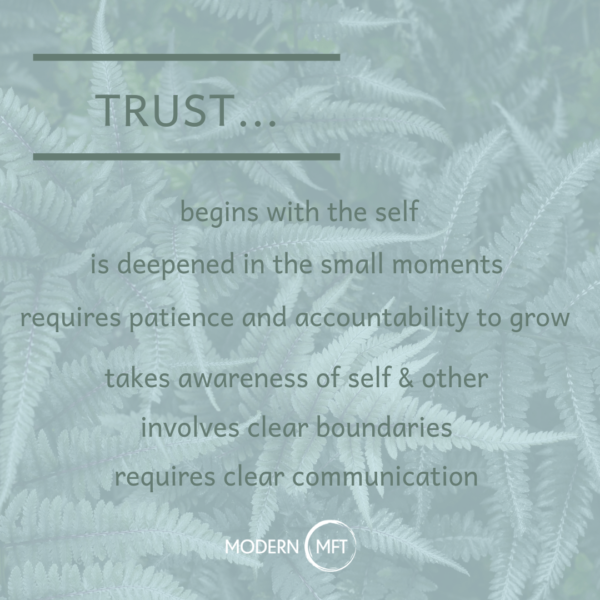When trust feels solid, we feel a strong sense that we are on the same page with someone. We feel they truly understand and value us and respect our wishes and views. But how is it built? What exactly is involved?
Trust is essential when it comes to intimate relationships – trust in ourselves and in others. It can be very difficult to learn to trust again after a betrayal in a relationship. However, it’s important to recognize that betrayal pertains not only to relationships with others but also in relationship to self. Self-betrayal might look like a lack of congruence or when our actions and words and feelings are out of alignment. So how do we deepen and sustain trust?
When trust has been broken in some way, or we are struggling to feel a strong sense of trust, it disrupts the entire ecosystem of a relationship. Understanding trust helps us have a language around the specifics so we can hone in and work on certain areas and also ask for what we need in relationships.
Brené Brown is a leading researcher and author on several topics regarding the human condition. Her contributions have been incredibly valuable as she delves deep into helping us understand important and difficult-to-talk-about-topics like trust, vulnerability, courage, shame, and their impact on human connection. In a recent talk, she shares:
“If braving relationships with other people is braving connection, self-trust is braving self-love/ self-respect.” -Brene Brown
What does is mean to truly value and respect ourselves? What does that look like? What does that really feel like? *Journal prompt for self discovery: take a piece of paper or a journal and write out the following prompt: If I truly valued and respected myself, I would:
In a recent podcast, Dr. Brown discusses her acronym BRAVING to describe in greater detail what allows us to trust according to her years of research. Something that was striking to me was her focus on the importance of self-trust first.
As I was listening, I was also struck by how challenging this might be at times…what do you think might get in the way of building or deepening self-trust?
If this experience of self-trust wasn’t emphasized in our family-of-origin or our caregivers didn’t operate with self-trust themselves, how can we begin to develop self-trust as adults? Or, perhaps we’ve had a history of self-haring behaviors or tendencies toward self-sabotaging behaviors – which is common among adults who have experienced trauma, how then does that impact our ability to practice self-trust on a regular basis? How can we nurture a robust sense of self-trust so that we can also practice this in intimate relationships?
First, what is meant by trust?
According to Charles Feltman, author of The Book of Trust, “Trust is choosing to make something important to you vulnerable to the actions of someone else. Distrust is what I have shared with – that is important to me – is not safe with you.”
According to Dr. Brown, self-trust can be defined and explored using her acronym BRAVING:
Boundaries—”Am I honoring my own boundaries?” “Am I paying attention to them when it comes to my self-care and relationships?”
Reliability—“Can I count on myself? “Am I following through on what I say I will do?” Am I consistently responding to my own needs? This also involves being clear and honest with yourself so that you don’t over deliver on your commitments.
Accountability—“Am I holding myself accountable?” Am I willing to accept responsibility for my mistakes or where I went wrong? Can I acknowledge when I have made a mistake?
Vault—-“Am I protective of my stories?” Maybe there are parts of yourself you want to keep private until a person has shown you they are worthy of hearing your story? “When do I decide to let someone in and why?” “When does it feel safe to feel close and why?”
Integrity—-“Did I stay in my integrity?” Brené Brown defines this as:
1. choosing courage over comfort/not taking the easy way out
2. choosing what’s right over what’s fun, fast, or easy
3. practicing your values, not just professing your values
Non-judgement—“Is it okay if I fall apart and ask for help sometimes?” “Am I judging myself harshly without any compassion?”
Generosity—“Do I give myself the benefit of the doubt?” “Can I assume the generous thing about my words, intentions, and behaviors?”
How does all of this land for you? What do you think?
If you are struggling with self-trust and you are looking to learn and practice skills and deeper self-awareness, you may want to consider joining my upcoming Seeking Safety group starting in October. The group focuses on healing from trauma and self-harming tendencies. To register or to learn more, please contact me at 917.708.7088.

